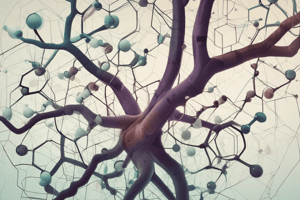Podcast
Questions and Answers
What is the primary focus of Organic Chemistry?
What is the primary focus of Organic Chemistry?
- Study of organic compounds (correct)
- Study of inorganic compounds
- Study of chemical analysis
- Study of physical principles
What is the function of Valence Electrons?
What is the function of Valence Electrons?
- Determine the atomic number
- Form Ionic Bonds
- Reside in the nucleus
- Involve in chemical bonding (correct)
What type of bonds are formed by the transfer of electrons?
What type of bonds are formed by the transfer of electrons?
- Chemical Equations
- Hydrogen Bonds
- Covalent Bonds
- Ionic Bonds (correct)
What is the role of Catalysts in Chemical Reactions?
What is the role of Catalysts in Chemical Reactions?
What is the mass of one mole of a substance?
What is the mass of one mole of a substance?
What is the unit of measurement equal to 6.022 x 10^23 particles?
What is the unit of measurement equal to 6.022 x 10^23 particles?
What is the purpose of Chromatography?
What is the purpose of Chromatography?
What is the role of Reactants in a Chemical Reaction?
What is the role of Reactants in a Chemical Reaction?
What is the purpose of Chemical Equations?
What is the purpose of Chemical Equations?
What is the function of Electrons in an atom?
What is the function of Electrons in an atom?
Flashcards are hidden until you start studying
Study Notes
Branches of Chemistry
- Inorganic Chemistry: Study of inorganic compounds, which are typically derived from mineral sources.
- Organic Chemistry: Study of organic compounds, which are typically derived from living organisms.
- Physical Chemistry: Study of the physical principles underlying chemical reactions and processes.
- Analytical Chemistry: Study of the analysis and identification of the chemical composition of substances.
- Biochemistry: Study of the chemical processes that occur within living organisms.
Atomic Structure
- Atoms: The building blocks of matter, consisting of protons, neutrons, and electrons.
- Protons: Positively charged particles that reside in the nucleus.
- Neutrons: Particles with no charge that reside in the nucleus.
- Electrons: Negatively charged particles that orbit the nucleus.
- Valence Electrons: Outermost electrons involved in chemical bonding.
Chemical Bonding
- Covalent Bonds: Bonds formed by the sharing of electrons between atoms.
- Ionic Bonds: Bonds formed by the transfer of electrons between atoms.
- Hydrogen Bonds: Weak bonds between atoms with a hydrogen atom bonded to a highly electronegative atom.
Chemical Reactions
- Chemical Equations: Representations of chemical reactions using chemical formulas and symbols.
- Reactants: Substances that undergo a chemical change.
- Products: Substances formed as a result of a chemical reaction.
- Catalysts: Substances that speed up chemical reactions without being consumed.
Stoichiometry
- Mole: A unit of measurement equal to 6.022 x 10^23 particles.
- Molar Mass: The mass of one mole of a substance.
- Avogadro's Law: Equal volumes of gases at the same temperature and pressure contain an equal number of molecules.
Laboratory Techniques
- Chromatography: A separation technique based on differences in partition coefficients between a stationary phase and a mobile phase.
- Spectroscopy: A technique used to measure the interaction between matter and electromagnetic radiation.
- Titration: A technique used to determine the concentration of a substance by reacting it with a substance of known concentration.
Branches of Chemistry
- Study of inorganic, organic, physical, analytical, and biochemical compounds, derived from minerals, living organisms, and physical principles.
Atomic Structure
- Atoms are the building blocks of matter, consisting of protons, neutrons, and electrons.
- Protons are positively charged particles that reside in the nucleus.
- Neutrons are particles with no charge that reside in the nucleus.
- Electrons are negatively charged particles that orbit the nucleus, with valence electrons being involved in chemical bonding.
Chemical Bonding
- Covalent bonds are formed by sharing electrons between atoms.
- Ionic bonds are formed by transferring electrons between atoms.
- Hydrogen bonds are weak bonds between atoms with a hydrogen atom bonded to a highly electronegative atom.
Chemical Reactions
- Chemical equations represent chemical reactions using chemical formulas and symbols.
- Reactants are substances that undergo a chemical change.
- Products are substances formed as a result of a chemical reaction.
- Catalysts are substances that speed up chemical reactions without being consumed.
Stoichiometry
- A mole is a unit of measurement equal to 6.022 x 10^23 particles.
- Molar mass is the mass of one mole of a substance.
- Avogadro's Law states that equal volumes of gases at the same temperature and pressure contain an equal number of molecules.
Laboratory Techniques
- Chromatography is a separation technique based on differences in partition coefficients between a stationary phase and a mobile phase.
- Spectroscopy is a technique used to measure the interaction between matter and electromagnetic radiation.
- Titration is a technique used to determine the concentration of a substance by reacting it with a substance of known concentration.
Studying That Suits You
Use AI to generate personalized quizzes and flashcards to suit your learning preferences.





